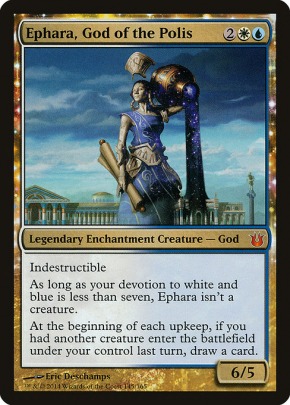DirkGently wrote: ↑4 years agoI mean, if you goal is to win as often as possible then 1v1 is obviously the way to go. Although I'd say winning a 4 player game counts as doubly impressive, so it's twice as satisfying. Which is something close to my goal when I play.onering wrote: ↑4 years agoThat's technically correct but so broad as to be irrelevant. At that point you might as well argue that playing 1v1 is better than 4 player ffa because your chances of winning are doubled. Your original post concerned a specific situation so thats really the topic at hand, and that scenario is a pretty clear telegraph that player 4 has an answer that will stop player 1s Kiki, so chances are player 4 will have the advantage in that scenario. Kiki being dealt with means that player 1 is going to lose a primary wincon, and whether it's pathed or hit by whatever player 4 has that is happening. If my deck was going to be handled like that, I'd be more afraid of facing one person who wanted the 1v1 scenario than 3 who have to worry more about each other than me. I could see scenarios where the Kiki player could benefit (player 4 is mono blue and player 1 has red elemental blast in hand), but usually this deal is going to heavily favor 4, because even if he doesn't have an immediate way to pressure player 1 after removing Kiki lined up the 1v1 matchup once the game hits the mid rounds intrinsically favors the control deck.
You're implying a lot of stuff that's not part of the scenario.
Maybe p4 is playing a precon. Maybe p1 has a deck full of other wincons and Kiki conscripts is incidental. Maybe this is a slam dunk for p1.
Or maybe p4 has a cedh control deck and p1 has a glass cannon combo deck with no alt wincons, and this is a slam dunk for p4.
Orrrrr maybe p2 and/or p3 have 500 power on board and p1 and p4 are almost certainly dead without the deal, giving both a far better chance regardless.
You can accept the hypothetical as a hypothetical, or we can waste a bunch of time trying to fine tune a scenario that perfectly matches the percentages. I'm sure there's some situation where that would be true. But I don't know what the point would be to find it.
How about we try to think about the actual implications of this kind of scenario, broadly, rather than distract ourselves with a bunch of unimportant specifics?
Namely:
How do we feel about deals to cut people out of the game? Especially in the context of helping someone else combo through another player's answer?
I know for myself, while I think it's a legitimate play, I'd have a hard time not being upset that, despite having the answer, I lost because another player defended the combo player.
Sorry, but the specifics are important, and the hypothetical useless when bereft of specifics, when trying to answer your central question, because it's too vague and people will feel differently about the play depending on the specifics.
For instance, if it seemed like a smart play for both players, Id be more fine with it than if it was clear that one was likely making a mistake (and it later proved to be true). So for me, if the counterspell player was running a precon against a more tuned combo deck, I'd be salty about him making a stupid decision but not mad at the combo player for taking it, but if the counter player was playing a better built control deck and the combo player was playing a deck that couldn't break through a control wall, I'd be annoyed at that player (but less so, as the play wouldn't be as obviously bad). Basically, for me, my level of annoyance is predicated on how bad of a decision it is for the players making it. It's sort of poor sportsmanship either way, but a little cutthroat now and then is fine, so long as it's a smart play. Meanwhile, I'm not getting annoyed at boneheaded plays that don't screw people over.
In your answer, you said you'd feel a bit salty that player 4 helped the combo player get their combo through to kill the other two. I'm wondering if that is a bit depending on the specifics of it being a combo and it getting through because player 4 stopped you from answering it? (In the hypothetical at least). What if the specifics were different but the overall effect was the same? What if player 1 resolved Insurrection and player 4, with 7 islands untapped, told player 1 he would cyclonic rift if player 1 attacked him, causing player 1 to only kill players 2 and 3? That's cutting a deal to take out two players, but in this case it's not a combo and it is the second player merely refusing to save the other two rather than stopping an answer. What if instead of Insurrection player 1 just had built up a board capable of swinging for lethal? Would it be different if player 1 was running Voltron and player 4 used the threat of a rift to direct him to player 3, while player 2 is unaffected? What about player 4 offering to remove player 3's sphere of safety so player 1 can attack him for lethal? What about player 4 offering to wipe the board with Roiling Earthquake to save player 3, which will kill player 2 who is low on life but safe from attacks behind a pillow fort? All of these involve a deal that cuts a player out of the game, but they all play out very differently, and I'd react differently to each.




